Where’s the humanity in AI-generated music curation? Is the algorithm really giving you music you want to hear, or what they want you to hear? And yet handcrafted radio is going out of style…
by Fred Jacobs of Jacob’s Media
We’ve been sold a bill of goods. For years now, we’ve been told how algorithms can be deployed to anticipate what we’ll like at any given moment in time.
Whether it’s online shopping, a restaurant suggestion, a song we’d like, a movie we’d enjoy, or a podcast we’d love, the idea is that a computer-generated prediction is more reliable and satisfying than one a human cooks up. I thought about this after reading your many responses to last week’s blog post about Merriam-Webster’s selection of “authentic” as 2023’s word of the year.
Many of us believed their pick would be a hands-down selection for “artificial intelligence” – clearly, the buzzword that captivated our thoughts, our fears, and our imaginations over the past many months. And the recent drama over Sam Altman’s tussle with the board at OpenAI only underscored the much-hyped theme about how this technology would dominate our personal and professional beings.
But are the algorithms actually working? Are we truly getting the best possible cyber choices from our robotic friends?
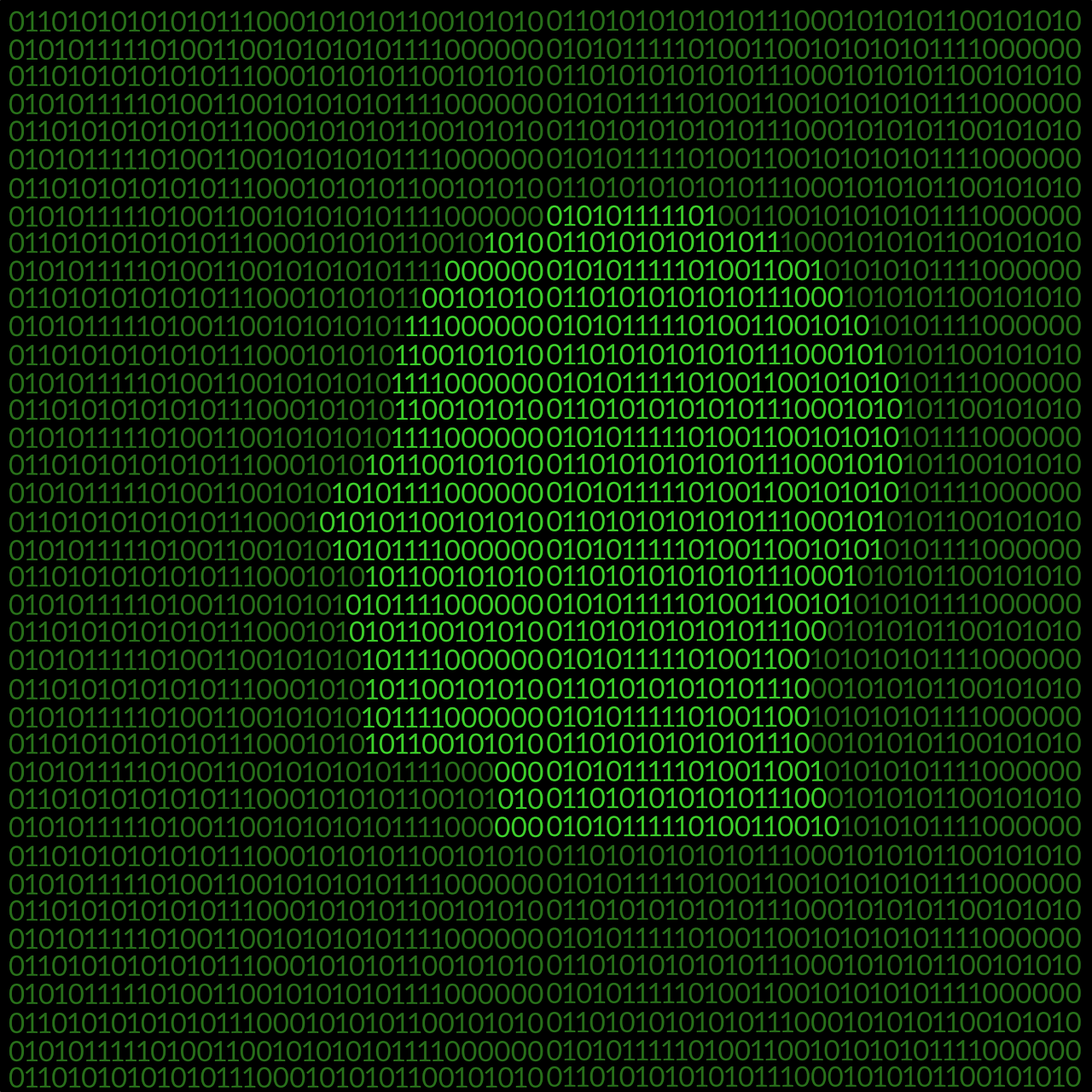
When I look at the “suggestions” on Amazon, Netflix, and other tech platforms, I find myself consistently disappointed by the selections. As someone who enjoys music, I often feel let down by digital streaming platformsthat attempt to find songs and artists that sound like the one I chose to start the process.
For all the data these algorithms have at their disposal, I continue to be disappointed by the choices the bots try to pawn off on me, forcing me to skip songs frequently. How did Little River Band end up on the same playlist with Neil Young?
And why don’t the algorithms respond more intuitively to taste sensibilities? Why can’t I ask for Rod Stewart songs that have no resemblance to “Do Ya Think I’m Sexy?” Or more obscure Tom Petty songs than his biggest hits like “Refugee.” If these algorithms are so good, why can’t they do a more nuanced job of filtering tastes and incorporating layers?
I don’t think I’m alone. The concept of authenticity is something many consumers yearn for. And there’s nothing authentic about an algorithm. But that’s the path we’re on. As the automatons take over our entertainment and information machines, why can’t I have a real human with great taste who would be my pop culture Sherpa – someone whose curation skills were well-honed, smart, and savvy? Most of us have had people in our lives with just that skill who have helped us navigate music, art, movies, and TV. But sadly, in an age of infinite choice, the algorithms are now dulling the experience.
It certainly would come in handy when we sit down to watch TV. Yes, the big streamers lay out their selections, row by row and end to end across our screens. But we have to do the perusing, trying to make judgments as to whether a movie, TV show, or documentary is just what we’re looking for. Or we can take their suggestion: “Because you watched Succession, you might like this.” But often we don’t because the algorithms come up short.
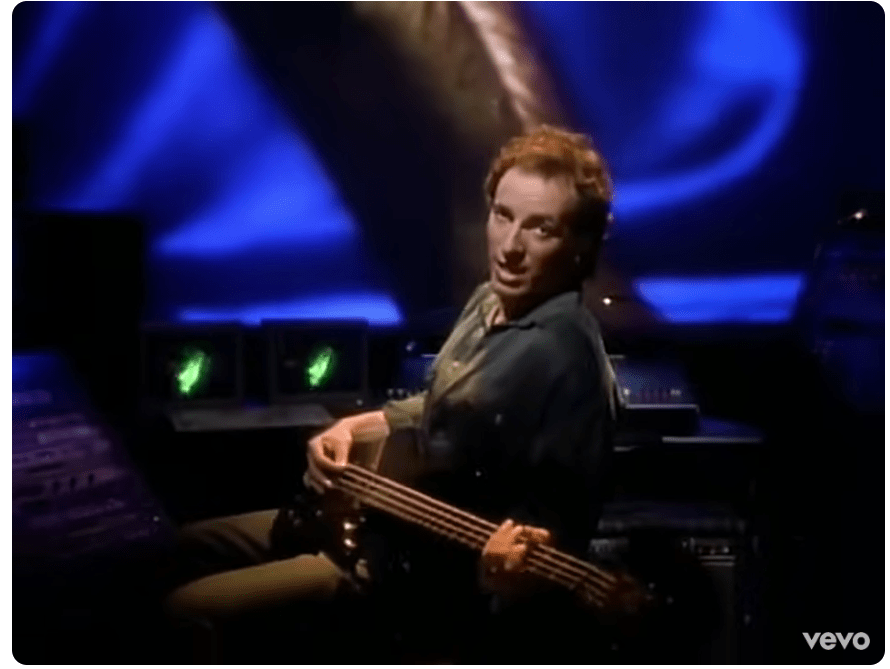
To make matters worse, there are seemingly infinite choices in front of us, making it even more stressful and aggravating to find just what we want to watch or listen to next. Amazingly, Bruce Springsteen sung “57 Channels And Nuthin On” exactly 30 years ago. There’s no way he could have imagined we’d have more than 10 times that many choices today. . . with the same reaction.
Sadly, most of our options – whether it’s streaming audio, video, podcasts, and most other content – are plentiful but sadly similar to one another. Nothing truly differentiates one outlet from the other. They all use computer generated algorithms to predict what we’ll want. I defy you to point to an outlet with a superior robotic prediction engine.
In fact, wouldn’t a better more interesting option be using talented programmers to take us by the hand and lead us to the good stuff?
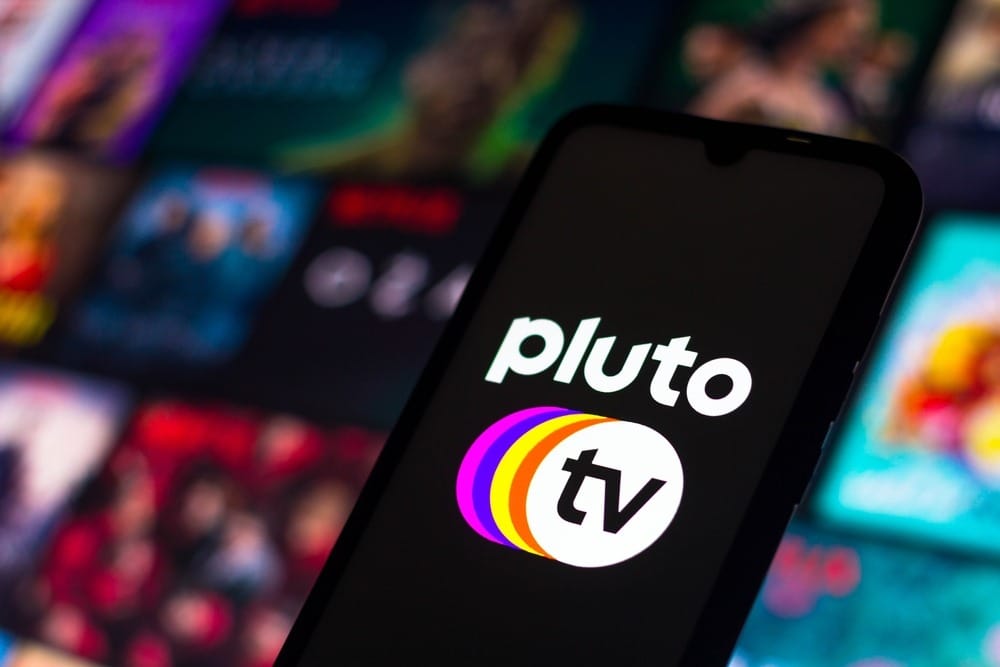
That’s what Pluto TV is betting on.
If you’re not familiar with this platform, Pluto is a different animal, rapidly emerging in the world of television. Unlike Netflix, Disney+, Hulu, and other subscription video channels, Pluto TV is in a category known as FAST TV.
It’s free, ad-supported, it streams, and it typically has a ton of content. All sorts of stuff to watch.
As Kourtnee Jackson reports in a recent CNET story, FAST TV fits in right between cable TV and subscription video streaming services.
For the moment, Pluto TV and Tubi (owned by Paramount Global and Fox respectively) are the biggest of the lot, but there are undoubtedly more of these hybrids on the way. As more and more consumers have become alienated by rising subscription fees and monthly credit card bills out of control, these options are looking better and better.
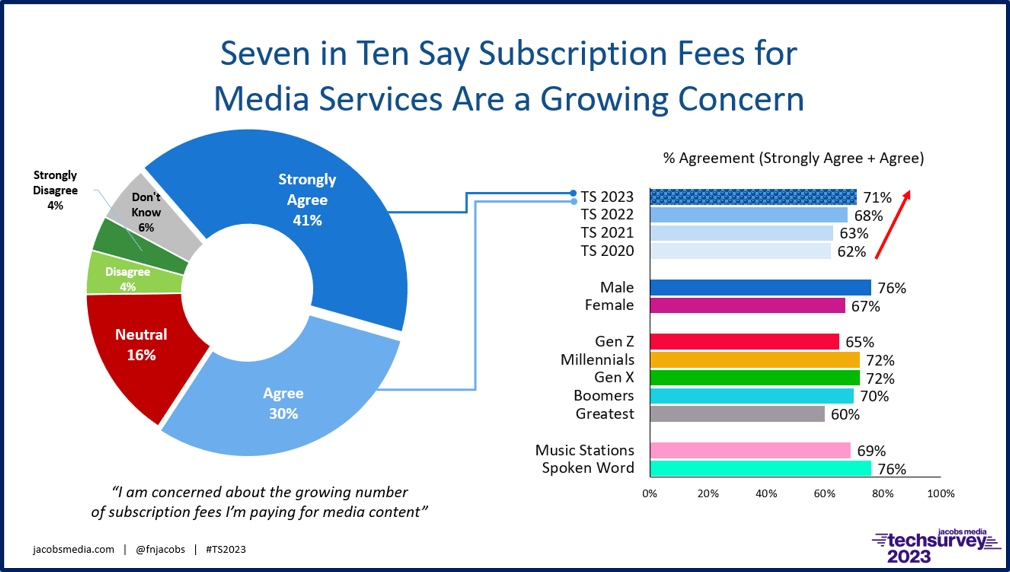
Typically, a lot of the content on these channels falls under the “classic” heading – old shows laced with nostalgic appeal. But original programming is beginning to make its way onto both Pluto TV and Tubi.
As a result, these platforms are becoming more and more popular – and aggressive. Consider that Tubi ran an ad on this year’s Super Bowl – a disruptive, buzzworthy spot that had the desired effect: it grabbed attention, so much so that viewers thought their TV were being taken over by the streaming platform mid-game.
And now Pluto TV is taking to the airwaves with a spot of its own that’s features a different tactic to get our attention. Pluto TV is using the human touch to differentiate itself from the legions of streaming television channels that rely on robots.
A new story in Marketing Brew talks about the strategy of “human-led curation” on the platform. In a 180 from AI program selection, Pluto TV is pinning its hopes that real people recommendations could be the differentiator.
The humorous campaign is called “Programmed by Humans,” utilizing three spots where a Pluto TV curator shows up in the homes of viewers. Now could an algorithm do that?
Pluto TV employs more than 50 programmers whose job it is to make host decisions about what content the platform will feature.
Their global SVP/head of consumer marketing, Val Kaplan, explains the Pluto TV strategy:
“Part of the reason the human experience of watching Pluto is so authentic is because we have a very human element to our programming.”
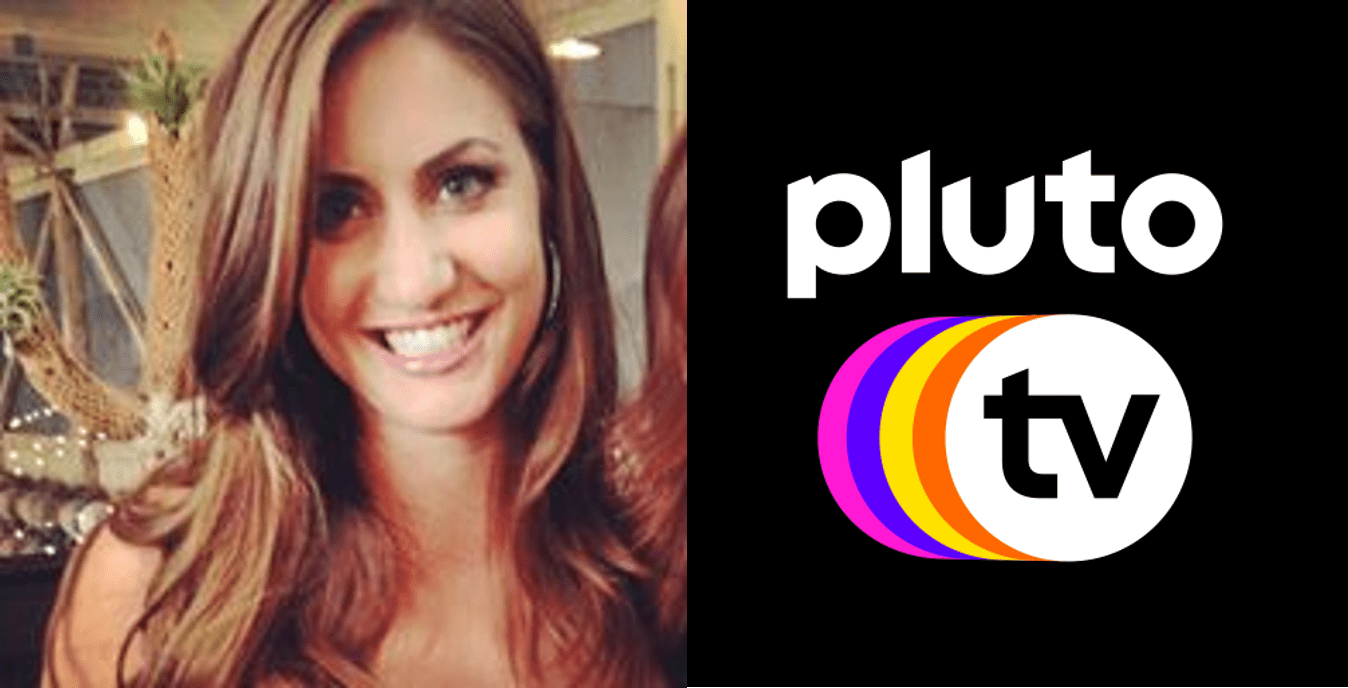
There’s the A-word again, obviously something Pluto TV is emphasizing. Are there really no bots or algorithms in their selection system? Of course not. But as Kaplan points out, it’s Pluto TV’s human element that makes them different:
“Of course, we leverage data, we leverage AI and machine learning and all of that, but (the campaign) is really meant to enhance the human creativity and real-life fans who make our programming and experience what it is.”
Smart.
Now perhaps it’s debatable just how much humans are truly programming the decisions on Pluto TV, but the power of this imaging is obvious. Most of us have an inherent fear of the robots taking over how lives – and our media. We’re already preprogrammed to mistrust the bots. All Pluto TV is doing is playing to our desire for authenticity, as well as paranoia over rampant technology.
Consider this data point from our recent Public Radio Techsurvey where nearly three out of four fans express alarm over AI’s rapid progress:
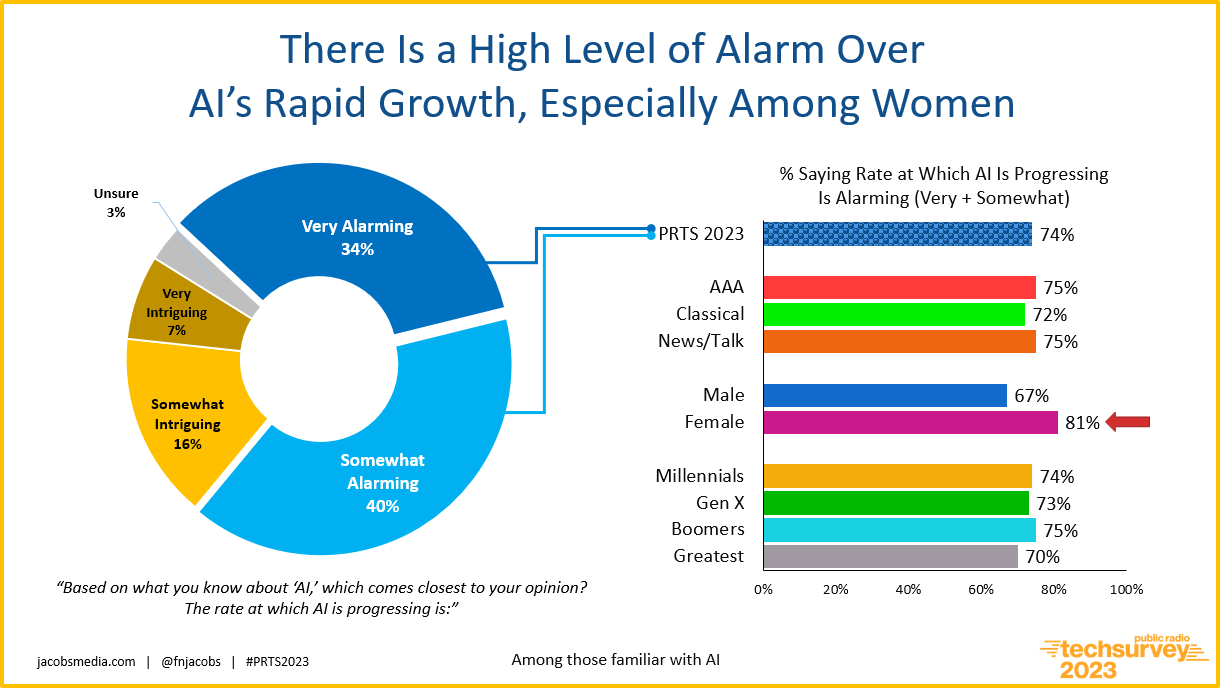
These public radio fans are the most educated consumers – most have advanced degrees – and they’re deeply concerned about the influence of AI. Notably, the Millennials show as much alarm as Gen Xers and Baby Boomers.
So if consumers are predisposed to be skeptical about robotic recommendations, why couldn’t many radio stations make the same case as Pluto TV? After all, who knows what rockers in Detroit want (or Boise or Austin or…) better than the veterans who work for your radio station and live in your market?
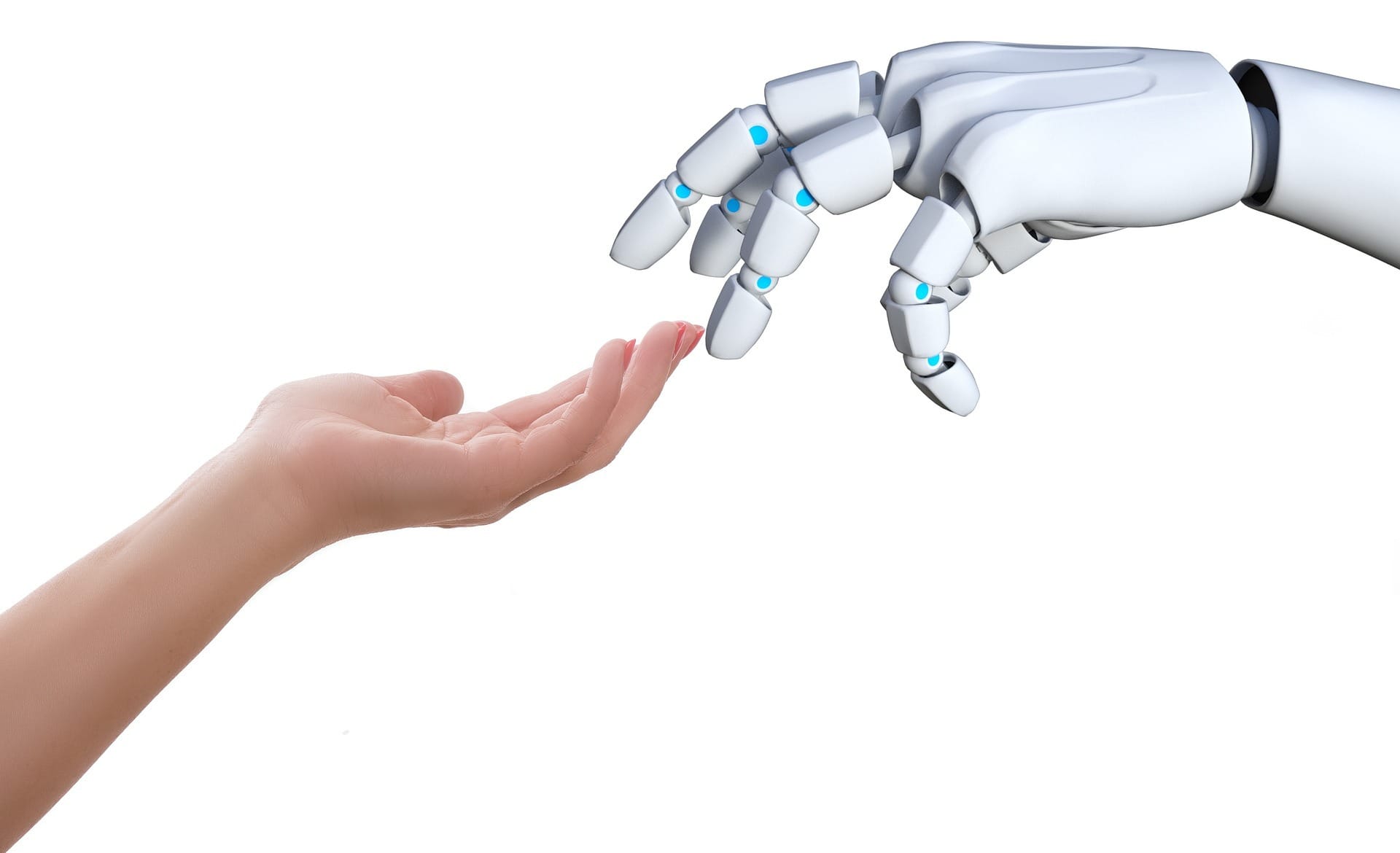
Spotify, Pandora, and other streaming audio platforms have distinct features and advantages – along with their premium subscription costs – but none has that human touch.
I am only too aware that many FM music stations no longer have more than a handful of warm bodies trying to stay on the air and maintain some semblance of a service. Or that out-of-towners are voicetracking or programming from thousands of miles away.
But there are thousands of others who still are “doing radio” the old school way. They are programing their stations every day – by hand. Some personalities even have an elemental control over what they play, particularly during feature segments. And they live in the markets where they work.
If Pluto TV can have fun with this concept in their advertising and not take itself too seriously, why couldn’t clever, smart local radio stations make a similar case?

Here’s an interesting aside – “Handcrafted Radio” is a streaming service out of Okemos, Michigan started by radio vet, Dan Kelley, way back in 2007. Dan, a veteran of the radio wars, is now an integral part of the Michigan Association of Broadcasters team. But great music is obviously his passion. And it looks like he’s had the positioning right all along.
In a world freaked out by out-of-control AI and robots running amok, why wouldn’t hand-crafted music 24/7/365 help your radio station stand out?
Now about that Steely Dan/Mark Knopfler station I’m trying to build….
Thanks to Chris Brunt.
You can support “Handcrafted Radio” here.
Hundreds of stations have already signed up for Techsurvey 2024, launching next month. Get more info here to get local data like the type shown in this post.
Fred Jacobs founded Jacobs Media in 1983, and quickly became known for the creation of the Classic Rock radio format. Jacobs Media has consistently walked the walk in the digital space, providing insights and guidance through its well-read national Techsurveys. In 2008, jacapps was launched – a mobile apps company that has designed and built more than 1,300 apps for both the Apple and Android platforms. In 2013, the DASH Conference was created – a mashup of radio and automotive, designed to foster better understanding of the “connected car” and its impact. Along with providing the creative and intellectual direction for the company, Fred consults many of Jacobs Media’s commercial and public radio clients, in addition to media brands looking to thrive in the rapidly changing tech environment. Fred was inducted into the Radio Hall of Fame in 2018.





